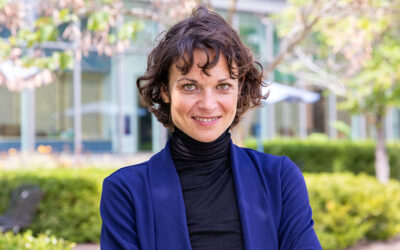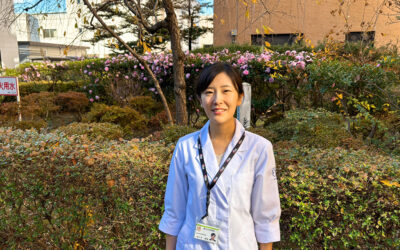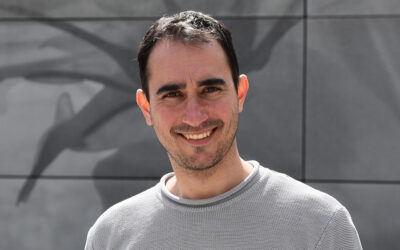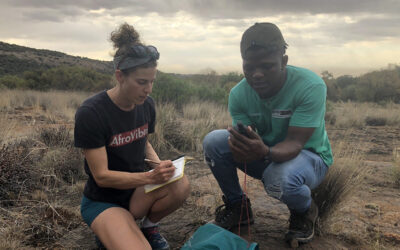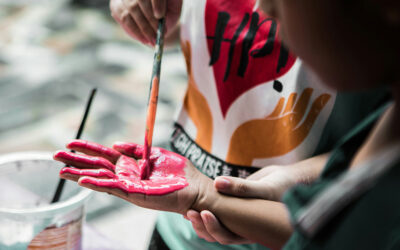Image credit: John Buckingham
Though we had never met prior to our interview, speaking with André Isaacs felt like catching up with an old friend. Originally scheduled for one hour, our meeting went more than twice that time. We talked about his love for science, his enthusiasm for teaching, RuPaul, as well as his passion for art, music, and, of course, dance. The whole time I had a huge smile on my face, intently listening to everything he had to say.
As an associate professor of chemistry at the College of the Holy Cross, in addition to his work on copper catalyzed reactions via click chemistry, Isaacs is making a name for himself on social media with his elaborate choreographed dances that he makes with his undergraduate students both in the lab and classroom.
His popularity stems not only from his impressive dance moves, but from his knowledge and compassion, demonstrating how important it is to break down the formal student/PI relationship and allow students to learn from their mistakes and grow within the scientific community.
Tell us a little bit about yourself. Where did you grow up and when was it clear to you that you wanted to be a scientist?
I grew up in Kingston, Jamaica, and I recognized that I wanted to be a scientist once I hit the eleventh grade. In Jamaica, which mirrors the British education system, you have to decide which track you want to go on after ninth grade. So, you had to do science or art, and I chose the science pathway. I started falling in love with chemistry and math in the eleventh and twelfth grade, but it really wasn’t until college that I started excelling in chemistry courses. [At that point,] I became convinced that I was destined to be a chemist.
If you could have done anything else (no matter how out there), what other career would you have picked?
Oh, that’s a tough one. I have so many interests and I think that is the problem.
I think I would definitely consider going into fashion, maybe designing runway looks. Alexander McQueen is literally an idol of mine and a more contemporary person would be Billie Porter, someone I admire a lot for his fashion. That’s the kind of fashion I could see myself embracing and wearing.
I know I would have gone into something like fashion because of the things I wear at work and the way I express myself, my identity — there’s definitely some fashion influence there.
Did you have any important mentors or people in your life who significantly shaped your studies and career?
Yes, I would say it all goes back to my uncle when I was in high school in Jamaica. Unfortunately, he died very young.
He had a small private high school and I struggled with my science education early on. He was a science teacher and he helped me a lot with understanding the basic concepts of chemistry and math. That really pushed me to becoming a stronger student in these two subjects. If it wasn’t for his guidance, I would not be a chemist today. I would have probably gone down another path, but he gave me a start and helped me to figure out my strengths.
But it really was in college, in my freshman and sophomore years, when my organic chemistry professor sat me down in his office and told me: “You are really one of the best students I have ever had. You have great promise. You should be going to graduate school. You should be considering a Ph.D. in chemistry. This thing comes naturally to you.” Another professor, with whom I worked in his research lab, taught me how to do chemistry and was another really important person in my life in terms of pursuing a career in [the field].
I am fortunate enough to call both of them my colleagues because I now work at my alma mater. I am now back as a professor working alongside the two people who inspired me and believed in me and pushed me to pursue this career.
Do you feel that with a successful career you are honoring your mentors?
Absolutely! I give people what I have received from others in order to give back.

Did you ever hit any walls or roadblocks and feel like quitting?
I would say one of the biggest challenges I had was in the middle of graduate school, around my 3rd year when I came out as queer — as a gay man. I had a very difficult time with family and friends, and I felt like quitting. I didn’t have the support.
I was alone in Philadelphia and had to rely on my friends in graduate school and my Ph.D. advisor, who was wonderful. He sent me off to San Francisco to work on a project with Genentech as a way to just take a break from research and focus on myself. But that was a moment when I recognized in graduate school it can be very difficult if you don’t have a community that supports you outside of the research.
[It’s important to understand that] you are not just a researcher, you’re a human being who’s growing, developing, and learning about who you are, and it’s so important to have a community that can support you.
That was one of my low points, and luckily for me I was blessed to have friends and an advisor who were willing to support me and give me the space to deal with the struggle of coming out and handling the family rejections that I had. It was a tough period, but it wasn’t about the science. It was more of a personal challenge that affected my ability to do my work effectively.
What advice would you give scientists and researchers just starting out?
My advice is two-fold. One, is you have to be okay with making mistakes. Making mistakes and failure is a part of the process. That is something I struggled with. I wanted every reaction to work, but I’ve learned more from my failures then I learned from my successes. I think they’ve made me a better scientist. Embrace failure as a part of the process.
The other thing, as I mentioned in the previous question, is to find a community that supports you, that uplifts you, where you can be your authentic self. Doing science is great but we have to be able to bring ourselves to the science in order to make it better.
We are scientists and individuals and we bring our own unique contributions to it. If you’re not part of a community that embraces your unique talents and values it as a benefit, then you’re not going to be able to bring your best. It is important to find a community that supports you, who continue to build you up and you should be happy to fail with that community behind you, to tell you that it’s okay to fail.
What are you currently researching in your lab and what excites you the most about your work?
Right now, I work exclusively with undergraduates. We are working on copper catalyzed reactions and our work is inspired by click chemistry. We make triazoles that we then fragment into reactive intermediates — ketenimines and rhodium carbenoids — and then we use those intermediates as a way to make heterocycles.
We try to come up with novel ways to make heterocycles that are, of course, of biological importance. Some heterocycles we are working on are indolizines, dihydroisoquinolines, and beta-lactams that are present in penicillin and other classes of antibiotics. So basically, copper catalyzed multi-component reactions to make heterocycles.
What would you say has been your most impactful contribution to your research field to date? What do you hope this might be in future?
I would say I love the research that I do and I think I contributed through my graduate school work and my independent career to publish research that encompasses contributions to synthesis and also methodology development.
But I would say I think my biggest contribution is that I am helping to train some stellar students who are going to make a huge impact on our world. Not just because of their talents in the lab, but because of the way in which they view diversity, the way in which they embrace each other and the values they take on, and I think they are going to be impactful. Training students has been the biggest joy of my career.
What do you consider exciting developments in your research field in the last 5 years? Who among your peers inspires you?
I think Phil Baran is a very inspiring chemist who has developed some very clever ways to synthesize naturally occurring compounds in short order and I have been very impressed by his ability to revolutionize synthetic organic chemistry. But in terms of actual chemistry, the current advances in electrochemical methods to make strategic carbon-carbon bonds, highly selective oxidation and reduction reactions is something that I think has revolutionized the field. I just think it’s extremely clever and something that I myself am interested in finding ways to utilize.
What scientific discovery (any field of research, topic or time in history) do you wish you would have made and why?
When I was younger I always had this dream of walking Einstein or Isaac Newton through current discoveries and the applications of their work.
If I have to pick a person though, I would like to have been Alexander Fleming. The discovery of penicillin is something that I would have loved to be present for and been the one who discovered it. That’s always something that I thought was a great story and just the sheer coincidence of that discovery is fantastic.
We’re so inspired by the relationships you have built with your students. Your choreographed dances on TikTok are especially popular. Can you tell us a bit about them?
You’re going to be shocked because I come up with very little of the choreography. It’s actually my students who come up with it or it is choreographed by professional dancers and then we re-create them and put our own spin on them.
One student in particular is a very good dancer and she will text me and say, “We should do this dance” and we will set up meetings and go over the choreography where she will teach me the steps and I add my own twist. We have several rehearsals and then we will record the video.
When [she] first approached me with the idea of doing TikTok videos I immediately responded that it’s a great idea and that we should do it. I actually said “Ok, this will be the first of a series of dances we are going to do”. And [doing TikTok videos] has been wonderful because I’ve taught this student for a number of semesters. She is an advisee of mine and we built a very strong relationship through our mutual love of dancing.
It’s strengthened my relationship with her and the relationship with all the other students that I have been making dance videos with. We are building this community of scientists in my department around dance and around having fun with each other.
How would you define your style as a PI? Did this develop naturally or have you had any experiences that led you to this style?
I think from the beginning this was always in my style and knowing that I make videos and publish them publicly, people are able to see how I am with my students. I’ve always had the philosophy with my students, and on the first day of class I tell them, whether they are my research students or in my class: “This material will be challenging, this work will be challenging, but I want you to view this as us forming an alliance against the material, not you and the material against the professor.”
I’ve always gone into my classroom and into my research viewing my relationship with my students as we’re colleagues or we’re co-workers, and I value their contributions as much as the ones that I bring to the table. I think I have knowledge that they want but at the same time, they have knowledge on a wide variety of areas that I can also benefit from. I think it’s a mutually beneficial relationship when we build an alliance versus a power dynamic, where they’re always just subordinate.
Is building relationships with your students important to you? What impact does this have on your research and lab culture?
I can’t say enough that it makes it easier for my students to communicate their failures, their concerns, their questions, when they know you’re not going to be mean to them or that they can just joke with you and you all can smile. When it’s a bad day they can still come and talk to you about whatever struggles they have and not have to worry about that impacting their work or their relationship with you outside of the academic setting.
Do you think sharing your relationship with your students through social media breaks down barriers for those who see elitism or exclusion in academia? What significance do you think this has for people i.e., students, your peers, perhaps even the perceptions of the general public?
I think that’s an excellent question, and when I started using social media, I did not anticipate the kind of feedback I’ve gotten. So far, it’s all been very positive. I’ve gotten a lot of comments and emails from students, faculty, and former students who exited STEM because they could not build a connection with an advisor or teacher. Many have reached out to me and said, “Your videos have given me hope for what STEM can be like.”
If I have to pick the comment that I get the most on my videos it would be: “I wish I had this relationship with my teacher or with my research advisor.” And I think it does break down stereotypes that people have about working in a lab where you cannot have fun, you can’t have a positive relationship with your advisor, you have to have a certain type of personality in order to be successful.
I think a lot more people are excited and interested in STEM after seeing my videos and the relationship that I’ve built with my students, and a lot more are going to persevere. They are hopeful that they will one day be able to have this kind of relationship and also provide that relationship for others once they become PIs themselves.
How long have you been active on social media as a researcher? What role (good/bad) do you feel social media plays within academia and science?
I’ve only been on social media for a year. I’ve always had private profiles like Instagram and Facebook, but nothing public until COVID-19 hit and I tried out TikTok. I think it has the potential to be good in the visibility it provides. It allows people to see science as it truly is; the joys of science outside of the way it’s projected in the media.
Particularly in the US, scientists are being attacked by politicians to push a narrative, that we’re not trustworthy, but we need to show that scientists do care about the work we do and it’s very important to us. But we’re also human beings and we live, we love, we want to be happy, and we want to provide the best drugs, the best cures, for everyone to benefit from. Social media provides a good platform to showcase that science is accessible to anyone who’s interested in it.
On the other hand, social media can be negative if it’s not used for good, and I guess I’ve not really seen anyone that’s put out any science content that would result in a negative view of science just yet, but I’m sure I’ll find something. For the most part I think it can only do good for scientists to really reclaim the narrative of what it is to be a scientist instead of being defined by others.
How do you work popular culture and social media into teaching? How do you think this helps students better connect with the material?
Oh yes, definitely. It’s not very easy in chemistry — there’s not really a natural way to say, “Here’s a hydroboration.” There’s nothing cool about the word hydroboration in popular culture. But finding ways to connect science and popular culture is very important.
[For example,] in one of my videos I was teaching my students about hydroboration and one of the reagents we use is called disiamylborane[(bis(1,2-dimethylpropyl)borane, Sia2BH)], which in shorthand is called “Sia”. Sia is a singer, so I’m like, “Just remember Sia and you’ll remember the name of the reagent.”
We have to realize that young people are part of a community that’s tied together by social media. That’s how they interact, that’s how they communicate and if we can find ways to connect learning to social media, we can reach everyone.
Do you have more students signing up to your classes because they want to be part of your funny videos?
Surprisingly, it would be hard for me to determine that because my classes always fill up, even before my social media days. It would be really hard for me to quantify that because the students have always wanted to be in my courses. They always fill up like one minute after enrollment starts.
My teaching style is something that resonates with a lot of my students. I think the TikTok videos are just an added bonus. What it shows them is that I’m accessible, I’m approachable. For a lot of students, this professor is trying to meet us where we’re at and sees value in the way we communicate and the social media platforms we use, the jokes we make, the language we use, and it’s taught me too. I think it’s helped me be a better professor because I now know what a lot of the phrases they use mean.
Do you practice work/life balance? Is this important (why/why not) or perhaps even possible in your line of work?
Yes, I do practice work/life balance. I think I got burnt out in graduate school after my third year coming out. In my final year of my postdoc I worked a lot of hours. I think my experience in graduate school and as a postdoc is was what really led me to consider a career as a PI, a professor at a primarily undergraduate institution because I value my work/life balance.
I have a lot of interests. I love being a scientist and there are some people out there where science is their entire existence. They will go out and they will publish amazing papers and they will change the face of their field. I am very happy with making incremental progress because, for me, I think it’s very important to share my joy with others and I can’t be locked away in a lab in order to do that.
What are …
Your interests outside of the lab?
What aren’t my interests outside of the lab? I have many. I love tennis and karaoke. Singing is fantastic. I also love plane spotting, where you go to a discrete location or an airport to watch planes land and take off in order to identify make and model.
Your favorite destination to travel to?
Paris, France
Your favorite dish?
Curried goat and rice with kidney beans, a traditional Jamaican dish.
A book you could read over and over again?
Brother Outsider by Bayard Rustin
A song everybody should listen and/or dance to?
Happy by Pharrell Williams
Your favorite RuPaul’s Drag Race contestant?
Alyssa Edwards. I even met her once at the drag show my college hosts every year. They always invite Drag Race contestants.
A RuPaul’s Drag Race challenge you would win?
The roasts! My students write comments on their exams just so I can write comments back and roast them, it’s great fun.
Your favorite movie?
La Bamba
Which actor should play you in a biopic?
Taye Diggs
A person from any point in history you would like to meet?
Nelson Mandela












